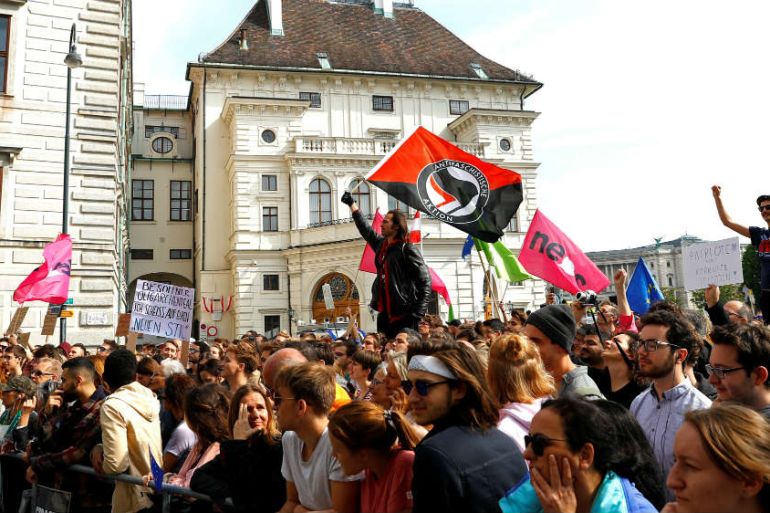Austria’s right-wing government implodes in scandal
All FPO-ministers will be replaced by technocrats as Austria gets a minority government for the first time ever.

Vienna, Austria – There is a significant chance that a 1990s Vengaboys song will become this year’s summer hit in Austria.
“We’re going to Ibiza” was played over and over again as protesters gathered in front of the chancellor’s office in Vienna on Saturday. “Ibiza-Gate” has triggered a political earthquake here.
Keep reading
list of 4 itemsGermany bans far-right Austrian nationalist Martin Sellner from entry
Australian efforts on Islamophobia flag despite Christchurch wake-up call
Norway court says mass killer Breivik’s prison isolation not ‘inhumane’
“That was one of the most remarkable political days in the life of us all. The mood was energetic,” says Can Gulcu, a 43-year-old curator at the Wien Museum.
Laura Holzinger-Sahan, a 22-year-old philosophy and history student agreed: “It was chaotic and stressful, but all the nicer that so many people were there.” The pair had brought together speakers and DJs to organise the protest. According to them, 15,000-20,000 people joined in.
Just a few hours earlier, German media outlet Suddeutsche Zeitung and Der Spiegel had released an explosive video.
It was recorded with hidden cameras in July 2017 on the Spanish island of Ibiza, and featured two well-known protagonists: Heinz-Christian Strache, who later that year was appointed vice-chancellor, and Johann Gudenus, a member of the Austrian parliament. Both are leading politicians in the Austrian right-wing party, FPO.
For more than six hours, they talk to a woman they understand to be the niece of a powerful Russian oligarch. The footage shows Strache offering government contracts.
Gulcu explains why the video has been so powerful: “It speaks for itself. It shows two drunk political leaders selling themselves and their power. And now the people have understood their character.”
‘Saviour and victim’
The video scandal has caused a government crisis and it is hard to keep track of the events since it was published. Not only did Heinz-Christian Strache and Johann Gudenus resign, but Chancellor Sebastian Kurz of the Austrian People’s Party (OVP) has announced snap elections.
After Kurz dismissed the right-wing interior minister Herbert Kickl on Monday evening, and all FPO-ministers left the government. They will be replaced by technocratic experts – and for the first time ever, Austria will get a minority government.
Gulcu wants Kurz to leave office as well. “Sebastian Kurz presents himself as a saviour and victim in a situation that he himself produced. He sells his story very well, as always,” says Gulcu.
In a statement, Kurz repeatedly pointed to his government’s achievements, including the implementation of the 12-hour work day, and reductions in social care spending, but mostly, that he avoided arguing with his coalition partner. He stressed several times that FPO and OVP had worked hand in hand.
Kurz may also face a motion of no-confidence in the Austrian parliament, which the FPO has said it would back.
Still, many Austrians perceive Kurz as an effective politician, a 32-year-old prodigy who has changed the political landscape of the country.
Maria, an 81-year-old pensioner who asked for her surname not to be published, says: “Kurz is a very reasonable young man with good ideas. And he worked so well together with FPO. It’s obvious that Strache was tricked into a trap.”
‘The country is boiling’
Nationalism has been on the rise in Austria in recent months, and the isolation of the country within the European Union has become more apparent.
FPO politicians have threatened journalists and published anti-Semitic poems, links with the Identitarian movement – who received a donation from the perpetrator of the Christchurch attacks – have been revealed, and anti-migrant rhetoric has dominated their public discourse.
Ingo Hartmann wants a drastic change in Austria’s political culture. “They need to raise the standard in the way they talk and they do politics in this country,” the 47-year-old architect told Al Jazeera.
This is also why Holzinger-Sahan and Gulcu joined Wiederdonnerstag, a collective that organises weekly protests against the current government.
“Wiederdonnerstag”, which means “Thursday again”, is a reference to demonstrations in the years 2000 and 2001, when the first coalition of FPO and the conservatives came to power.
“We address problems that concern us all – from education to housing, poverty, work, Europe, racism,” says Gulcu.
He expects even more people to turn up to this week’s protest. “Currently, the country is boiling,” he said. “And the demonstrations continue until something changes.”